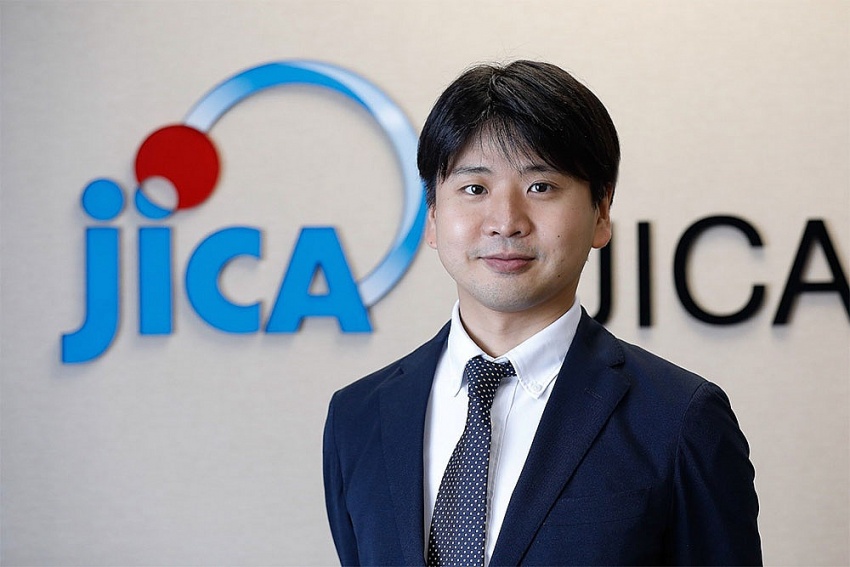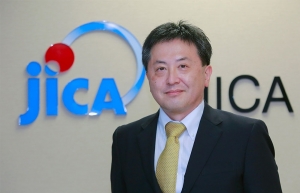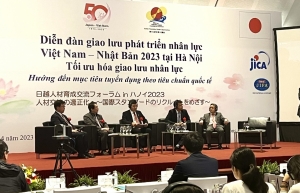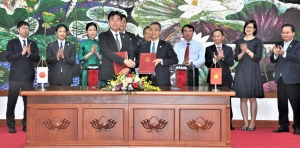Japanese cooperation focus stretching to new areas
How is the Vietnam-Japan economic, investment, and development cooperation taking place?
 |
| Kubo Yoshitomo, senior representative at the Vietnam Office of the Japan International Cooperation Agency (JICA) |
Since diplomatic ties were established in 1973, both nations have been boosting cooperation, currently within the Vietnam-Japan Extensive Strategic Partnership for Peace and Prosperity in Asia.
Economic ties have strongly increased since Japan began providing official development assistance (ODA) for Vietnam in 1954, with an accumulative sum of over ¥3 trillion ($21.2 billion). Total ODA committed by Japan for Vietnam currently accounts for almost one-third of the total global ODA to Vietnam, and Japan has become the largest such provider for Vietnam among the countries of the Organisation for Economic Co-operation and Development.
Japanese ODA has focused on key sectors of Vietnam such as transport, energy, and urban infrastructure. This includes construction of about 3,300km of roads, tantamount to 70 per cent of the high-quality two-lane roads in Vietnam; construction of power plants with total capacity of 4,500MW, or 10 per cent of national electricity output; and producing all rubella vaccines in the country’s expanded immunisation plan.
Other iconic projects include terminal 2 at Noi Bai International Airport, Nhat Tan bridge, Binh Hung Wastewater Treatment Plant, and metro line 1 in Ho Chi Minh City. Moreover, Japanese ODA has also gone to support Vietnam in the education sector and the enactment of the Civil Law.
What key projects has JICA carried out to help improve labour capacity and infrastructure in Vietnam?
Human development and infrastructure development have been the priorities in the Japanese government’s cooperation development policy with Vietnam.
Especially, JICA’s cooperation with Vietnam’s educational establishments such as Vietnam-Japan University, Vietnam-Japan Institute for Human Resources Development, Can Tho University, and Hanoi University of Science and Technology has helped train over 100,000 high-quality engineers.
With an aim to become a general university of 6,000 students, Vietnam-Japan University is expanding its campuses and opening a programme on doctorate training.
When it comes to infrastructure, important national roads in the north, Haiphong port, the expanded Cai Lan port, Lach Huyen port, and various bridges have been constructed.
In healthcare, we have continued contributing to Vietnam’s sustainable development through cooperation in strengthening the system at Bach Mai Hospital in Hanoi, Hue Central Hospital, and Cho Ray Hospital in Ho Chi Minh City.
What difficulties has the agency faced when implementing ODA in Vietnam, and how can the nation tackle such obstructions?
Other donors are also facing common problems in Vietnam. Specifically, many projects have been delayed, with slow disbursement due to complexity and overlap in procedures according to Vietnamese decrees and regulations. Many projects have had to wait for approval from senior leaders for even minimal changes in the project.
We hope that the Vietnamese government will make prompt decisions to solve these problems. This will help speed up the handling of procedures, and promote the early completion of projects.
What areas should the two countries prioritise to further promote cooperation?
We will focus on cooperation with Vietnam, especially in four areas. The first is cooperation in high-quality infrastructure, contributing to the economic development of Vietnam, typically the urban railway of Ho Chi Minh City and Noi Bai International Airport.
The second is cooperation in human resource development. Besides the Vietnam-Japan University project, Japan has been supporting Can Tho University for more than 50 years, contributing to training high-quality human resources for Vietnam.
The third is cooperation in the healthcare sector. In addition to cooperation through the aforementioned three core hospitals, we will support the establishment of an online training system at local healthcare facilities applying digital transformation technology.
What is more, JICA will continue to cooperate with Japanese private enterprises, non-governmental organisations, and universities in order to assist Vietnam in improving rehabilitation techniques and nursing care to cope with the ageing population that is becoming a new problem in Vietnam.
Lastly, JICA will continue cooperating with Vietnam in dealing with climate change. Following the wind power development project in the central province of Quang Tri, we are considering new credit to help Vietnam develop solar and wind power.
In addition, we will use the Green Climate Fund through activities of afforestation and protection of the natural environment to support the promotion of the circular economy, contributing to the implementation of measures to respond to climate change in order to realise the Vietnamese government’s goal of achieving net-zero emissions by 2050.
| Vietnam and Japan in July jointly signed three agreements valued at $442.5 million to fund new-generation ODA projects in Vietnam. Of the total, $362 million will be poured into an initiative on post-pandemic socioeconomic recovery and development. The rest will finance a project on improving the public transportation system in the southern province of Binh Duong and another project on ameliorating the infrastructure system for agricultural development in the Central Highlands province of Lam Dong. |
 | Rich Japanese cooperative culture set to continue After focusing on the pandemic in recent years, the Japan International Cooperation Agency (JICA) will continue to cooperate with Vietnam in strengthening its health system. This will be carried out specifically by strengthening the diagnosis and treatment system of hospitals such as Bach Mai Hospital, enhancing research and testing capacity for infectious diseases of the National Institute of Hygiene and Epidemiology, and building capacity of personnel of local hospitals. |
 | JICA and ILO promote cooperation between Vietnam and Japan The 2023 Vietnam-Japan Human Resource Development Exchange Forum 2023 was held on April 5 and discussed how to optimise the exchange of human resources between the two countries. The forum was organised by the Japan International Cooperation Agency (JICA) together with the International Labour Organisation (ILO) and the Vietnam Labour Export Association. |
 | JICA signs ODA loans for socioeconomic development The Japan International Cooperation Agency (JICA) on July 4 signed three loan agreements with the Vietnamese government of Vietnam to provide three official development assistance (ODA) loans worth up to $421 million in total over three years. |
What the stars mean:
★ Poor ★ ★ Promising ★★★ Good ★★★★ Very good ★★★★★ Exceptional
Related Contents
Latest News
More News
- State corporations poised to drive 2026 growth (February 03, 2026 | 13:58)
- Why high-tech talent will define Vietnam’s growth (February 02, 2026 | 10:47)
- FMCG resilience amid varying storms (February 02, 2026 | 10:00)
- Customs reforms strengthen business confidence, support trade growth (February 01, 2026 | 08:20)
- Vietnam and US to launch sixth trade negotiation round (January 30, 2026 | 15:19)
- Digital publishing emerges as key growth driver in Vietnam (January 30, 2026 | 10:59)
- EVN signs key contract for Tri An hydropower expansion (January 30, 2026 | 10:57)
- Vietnam to lead trade growth in ASEAN (January 29, 2026 | 15:08)
- Carlsberg Vietnam delivers Lunar New Year support in central region (January 28, 2026 | 17:19)
- TikTok penalised $35,000 in Vietnam for consumer protection violations (January 28, 2026 | 17:15)

 Tag:
Tag:


















 Mobile Version
Mobile Version